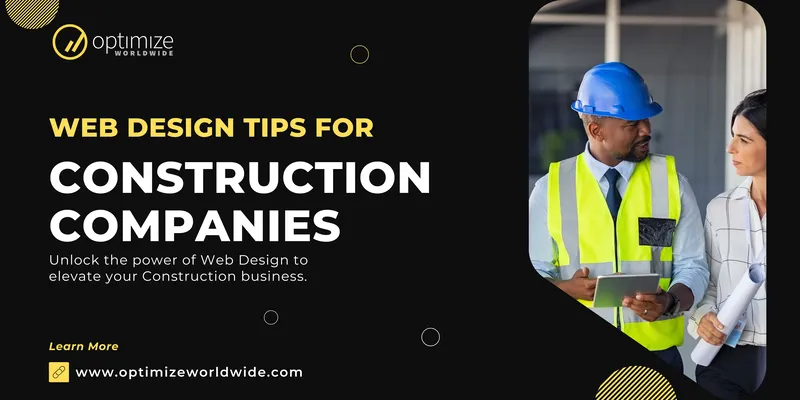In today’s digital world, a strong online presence is crucial for any business, including those in the construction industry. A well-designed website is not just a digital brochure; it is a powerful tool that can attract potential clients, showcase your work, and set you apart from the competition. Here’s a comprehensive guide on how a well-designed website can boost your construction business and what key elements to include.
Establishing Credibility and Trust
A professionally designed website helps establish your construction company’s credibility and trustworthiness. Potential clients are likely to research online before making a decision, and a polished, informative website will make a positive first impression. Key elements to include are:
- About Us Page: Share your company’s history, mission, values, and team members to build a connection with visitors.
- Portfolio: Showcase your completed projects with high-quality images and detailed descriptions to demonstrate your expertise and capabilities.
- Testimonials: Include client reviews and testimonials to provide social proof of your quality and reliability.
Improving Accessibility and Customer Service
A well-designed website enhances accessibility, allowing potential clients to find the information they need quickly and easily. This improved accessibility translates to better customer service. Key features to consider are:
- Contact Information: Make it easy for visitors to contact you by prominently displaying your phone number, email address, and physical address.
- Contact Form: Include a simple contact form for inquiries and consultations.
- FAQ Section: Address common questions and concerns to help clients understand your services and processes.
Showcasing Your Services and Expertise
Your website should clearly outline the services you offer and highlight your expertise in the construction industry. This clarity helps potential clients understand how you can meet their needs. Important sections to include are:
- Services Page: List and describe the services you provide, such as residential construction, commercial construction, renovations, and project management.
- Blog: Regularly update your blog with informative articles related to construction trends, tips, and case studies. This positions your company as an industry authority and improves SEO.
Enhancing Local SEO
Local SEO (Search Engine Optimization) is essential for construction businesses that serve specific geographic areas. Optimizing your website for local search terms can increase your visibility to potential clients in your service area. Key strategies include:
- Location-Specific Keywords: Incorporate your city, region, and other location-specific keywords throughout your website content.
- Google My Business: Create and optimize your Google My Business listing to appear in local search results and on Google Maps.
- Local Directories: Ensure your business is listed on relevant local directories and review sites.
Generating Leads and Conversions
A well-designed website is an effective lead generation tool. By guiding visitors through a seamless user experience, you can convert them into leads and, eventually, clients. Key elements to include are:
- Call to Action (CTA): Use clear and compelling CTAs throughout your website to encourage visitors to take specific actions, such as requesting a quote or scheduling a consultation.
- Lead Capture Forms: Include forms to capture visitor information in exchange for valuable content, such as a project estimate or an eBook on construction tips.
Showcasing Your Unique Value Proposition
Your website is the perfect platform to highlight what sets your construction business apart from competitors. This unique value proposition should be evident in your content, design, and overall messaging. Consider the following:
- Unique Selling Points (USPs): Clearly articulate your USPs, such as sustainable building practices, innovative design solutions, or exceptional customer service.
- Visual Identity: Use a consistent color scheme, typography, and design elements that reflect your brand identity and create a professional, cohesive look.
Enhancing Mobile Friendliness
With more people accessing the internet via mobile devices, having a mobile-friendly website is crucial. A responsive design ensures your website looks and functions well on all devices, providing a positive user experience. Consider the following:
- Responsive Design: Ensure your website layout adapts seamlessly to different screen sizes.
- Mobile Navigation: Simplify navigation for mobile users with a clear, intuitive menu and easy-to-click buttons.
Providing Regular Updates and Maintenance
A well-designed website requires regular updates and maintenance to stay relevant and functional. Keeping your content fresh and your website running smoothly helps retain visitors and attract new ones. Key actions include:
- Content Updates: Regularly add new projects, blog posts, and company news to keep your website current.
- Technical Maintenance: Perform regular technical maintenance, such as updating plugins and checking for broken links, to ensure optimal performance.
A well-designed website is a powerful asset for your construction business. It helps establish credibility, improve customer service, showcase your expertise, enhance local SEO, generate leads, highlight your unique value proposition, ensure mobile friendliness, and maintain regular updates. By investing in a high-quality website, you can boost your construction business and attract more clients.
Ready to elevate your construction business with a well-designed website? Contact Optimize Worldwide today to learn how we can help you create a high-performance website that drives results.
